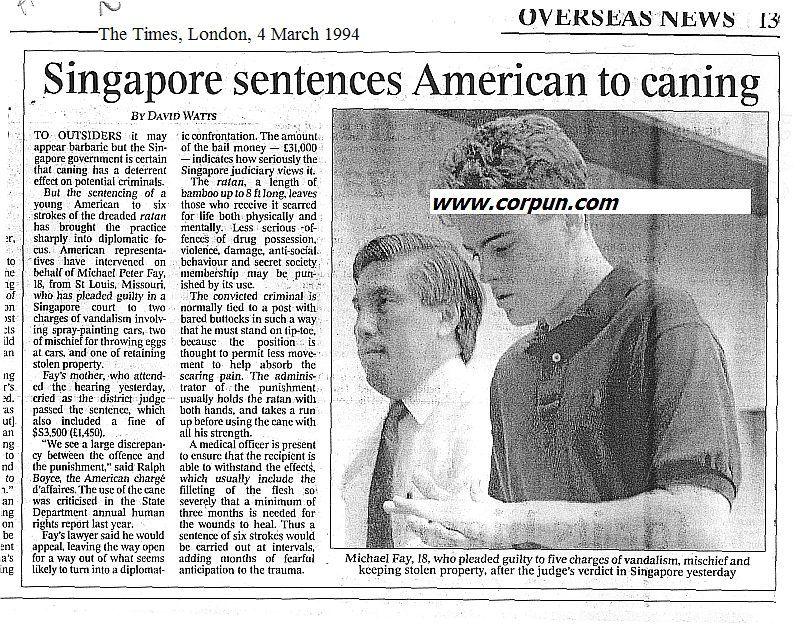日志
Govern on Vandalism, Wise Singapore mirrors Fools
|
Govern on Vandalism, Wise Singapore mirrors Fools
Frank April 19 2015 in Waterloo, On
The founding father of Singapore, Lee Kuan Yew who died at 91, the voice of praise and criticism are surging up.
Mr. Lee Kuan who has successfully transformed Singapore from one of Asia’s less developed resource-poor countries into an international economic powerhouse with good communist style social welfare, good social order, and good public living environment.
The outstanding achievements have gained admiration world widely.
However, great many of politicians and ordinary people admires for Singapore with contradictory mentality.
In consideration of Singapore's providing its citizen good social welfare and good living environment, people appreciate it as full of humanity, while considering the harsh of Singapore's law, people criticize it as lack of humanity.
The cause of such contradictory attitude is that many people are lack of a rational mind, so that, for serious social problems, they can not make rational judgments. They can not understand that, the law of the country is serious, because that it is an basic component of the state apparatus to ensure a basic social order. If anyone dares to violate the law to break social order, state apparatus must be able to effectively stop.
In this regard, Singapore is correct.
The caning penalty in Singapore is the most provocative, but, please look at the cause and legislative process of Vandalism Act for caning penalty, it is rigorous and rational.
The cause: according to Michael P. Fay - Wikipedia that last modified on 4 December 2014, in October 1993, The Straits Times, reported that car vandalism in Singapore was on the rise. Cars parked at apartment blocks were being damaged with hot tar, paint remover, red spray paint, and hatchets. Taxi drivers complained that their tires were slashed. In the city center, cars were found with deep scratches and dents. On
The legislative process: according to Vandalism Act (Singapore) - Wikipedia that last modified on Dec. 4 2014, after times Parliamentary Debate, following entry of Vandalism Act into force of the law.
Section 2 of the Vandalism Act defines an act of vandalism as:
(a) without the written authority of an authorised officer or representative of the Government or of the government of any Commonwealth or foreign country or of any statutory body or authority or of any armed force lawfully present in Singapore in the case of public property, or without the written consent of the owner or occupier in the case of private property —
(i) writing, drawing, painting, marking or inscribing on any public property or private property any word, slogan, caricature, drawing, mark, symbol or other thing;
(ii) affixing, posting up or displaying on any public property or private property any poster, placard, advertisement, bill, notice, paper or other document; or
(iii) hanging, suspending, hoisting, affixing or displaying on or from any public property or private property any flag, bunting, standard, banner or the like with any word, slogan, caricature, drawing, mark, symbol or other thing; or
(b) stealing, destroying or damaging any public property.
Public property means movable or immovable property owned by the Government of Singapore, the government of any Commonwealth or foreign country, any statutory body or authority, or any armed force lawfully present in Singapore.
Offences and penalties
Notwithstanding the provisions of any other written law, it is an offence under the Act to commit any act of vandalism, attempt to do any such act, or cause any such act to be done. Upon conviction, the penalty is a fine not exceeding S$2,000 or imprisonment not exceeding three years, and also corporal punishment of not less than three strokes and not more than eight strokes of the cane. However, caning will not be imposed on a first conviction if the act carried out falls within section 2(a)(i) and "the writing, drawing, mark or inscription is done with pencil, crayon, chalk or other delible substance or thing and not with paint, tar or other indelible substance or thing", or within sections 2(a)(ii) or (iii).
We must take note of the human side of the law.
1. Caning will not be imposed on a first conviction.
2. Caning will not be imposed on that writing, drawing, mark or inscription is done with pencil, crayon, chalk or other delible substance or thing and not with paint, tar or other indelible substance or thing.
Singapore is wise in social governance.
Then, take the famous case of American Michael P. Fay to look at the attitude of politicians and citizen for the same social problem in the United States.
The point of view from politicians and ordinary people is different.
March 30, 1994, the article Flogging of teen vandal draws ample backing introduced about the case:
From his comments of the writer Mike Royko  , I deeply believed that he is a rational American.
, I deeply believed that he is a rational American.
Following is his article.
On my desk is a stack of letters several inches high. They are from readers responding to my column about Michael Fay, who is to be flogged in Singapore. If you missed the story, a brief summary:
Fay, 18, lives in Singapore with his mother and stepfather. He and a group of other young goofs engaged in a wave of vandalism: spray-painting and throwing eggs at cars, switching license plates, tearing down traffic signs and so on.
That wasn't smart. Singapore is on
Fay was caught, pleaded guilty and was sentenced to four months in prison, a $2,000 fine and flogging. Flogging means he will be whacked six times on the bare butt with a length of bamboo, wielded by a martial arts expert. It is said that people who are flogged in Singapore sometimes go into shock and can be scarred on the buns for life.
Fay's father, who lives in Ohio, has been going on TV and radio, telling of his son's plight. President Clinton has protested the flogging to Singapore authorities. They have told Clinton to mind his own business.
When I wrote about young Fay, I didn't take a position. I tried to give two opposing arguments:
(1) The sentence seems harsh by American legal standards, and if it was your kid, you wouldn't like it.
(2) Singapore is a remarkably safe, orderly society precisely because it is rough on all lawbreakers (they hang drug dealers), and when you live in a foreign land, you better abide by its laws or suffer the consequences.
Back to the mail from the readers.
If the letters are an indication, young Fay and his father are asking the wrong country -- the United States -- to shed a tear of sympathy.
Or else I have some of the most hard-nosed readers this side of Singapore.
At least 99 percent of them said that, yes, hooray, he should be flogged, and flogging should be part of our justice system. That was an easy percentage to come to, since on
A few representative comments:
Tim Murtaugh, Melrose Park, Ill.: "I have no sympathy for young Mr. Fay. How often in this country do we see the criminal in fear? Interesting how troublemakers don't like a dose of their own medicine. Damage property here and you don't get punished. Someone is there to tell you you 'need help.' In the meantime, the property owner is stuck with the bill."
Tom Lavin, Niles, Ill.: "I'll bet you dollars to doughnuts that this guy never does it again. We should do it in this country. Five or six whacks on the can with a cat-o'-nine-tails is a great deterrent."
Lloyd Thornblad, Torrance, Calif.: "Fay chose to disobey the law, knowing the consequence. We were recently in Singapore and found the city head and shoulders above any others in cleanliness. Caning should make anyone think twice before being lawless."
Claude Waife, South Bend, Ind.: "That American punk is getting exactly what he deserves. If we had similar laws, I'm sure our streets wouldn't be under control of the thugs and slugs."
Chris Hill, Pasco, Wash.: "I called the Embassy of Singapore in Washington to tell them that I have no problem with the sentence. The embassy's attache mentioned that most of the calls he has received favored the sentence. Clinton should keep his red nose out of Singapore's business."
Fred Krauss, Kennewick, Wash.: "Bill Clinton sounds like an ass."
Bob Andrewski, Villa Park, Ill.: "Maybe what we need in this country are the same laws and punishment they have in Singapore. We wouldn't have the problems that we have today."
Jim Larson, Fox Valley, Ill.: "That 18-year-old lived in Singapore, so he knew about their strict laws. If we had their laws, there would be less killings of children, fewer dope peddlers, fewer children dope addicts and less destruction of property."
Virginia Sekenske, Chicago: "I wish something like that could be done here with these punks and their graffiti. I have no sympathy. I don't, I don't!"
.......
In writing ............
--- Frank April 19 2015 in Waterloo, On
President Barack Obama respected Lee respected Lee as "a true giant of history who will be remembered for generations to come as the father of modern Singapore and as one the great strategists of Asian affairs."
Former US President Bill Clinton respected Lee for that he transformed Singapore into one of the world?s strongest and most sustainable economies. He also firmly established his country as an important friend and partner of the United States. After leaving office, he continued to offer brilliant analysis and wise advice to those who sought it. We will always be grateful for our fascinating conversations over the years.
And also, it is that Bill Clinton leads a high-level US delegation to funeral of Mr Lee Kuan Yew.
In this regard, the American is foolish in social governance.
The difference in legislative concepts between Singapore and the United States involves the understand for government and human rights.
It is necessary to recall the definition of government of the American Founders in 200 years ago.
1788, in The Federalist #51 of The Federalist Papers, the fourth President of the United States James Madison wrote with that: “What is government itself, but the greatest of all reflections on human nature? If men were angels, no government would be necessary. If angels were to govern men, neither external nor internal controls on government would be necessary. In framing a government which is to be administered by men over men, the great difficulty lies in this: you must first enable the government to control the governed; and in the next place oblige it to control itself.
In viewing above definition that government must first enable to control the governed, the government of New York can not well control the governed.
The American is foolish in social governance.
Then to view the human rights.
The United States Declaration of Independence has declared well-known statement on human rights: "We hold these truths to be self-evident, that all men are created equal, that they are endowed by their Creator with certain unalienable Rights, that among these are Life, Liberty and the pursuit of Happiness."
In centuries Before, in the years that was chaos even human life with no basic security, above declaration, obviously, it is wise with extraordinary significance, it is enormous social progress.
No doubt, the human rights should be suitable for, and on
Unfortunately, human rights has been wrongly used to protect those criminals of human rights violations to encourage them boldly disrupting the normal life of law-abiding good people.
This is the sad of modern human society.
Thanks modern medical technology for revealing the mechanism of human brain and revealing the mystery of why some people are rational, and some are not, or even mindless.
The Magnetic resonance imaging (MRI) dynamic scans of human brains have gradually revealed the relations between the brain structures and the intelligence or the physical behaviors. Human behaviors, whether it is mental or physical, are dominated by certain cells in certain area of the brain.
Apr. 01, 2011, article Scans reveal differences in brain structure of antisocial teens reports that:
“The neuroscientists used magnetic resonance imaging to measure the size of particular regions in the brains of 65 teenage boys with conduct disorder (CD) compared with 27 teenage boys who did not display symptoms of behavioral disorder. Their findings revealed that the amygdala and insula – regions of the brain that contribute to emotion perception, empathy and recognizing were strikingly smaller in teenagers with antisocial behaviour. " "The greater the severity of the behaviour problems, the greater the reduction in the volume of the insula."
Mar. 04, 2011, article Criminal Minds Are Different from Yours, Brain Scans Reveal reported that: "The latest neuroscience research is presenting intriguing evidence that the brains of certain kinds of criminals are different from those of the rest of the population.” “While these findings could improve our understanding of criminal beha
Above studies show that human brain development varies greatly from person to person, so, people's intelligence and behaviors are also a great difference. That development degree of the human brain determines the brain’s working state; the brain's working state determines human behaviors. Or we may say that, it is that human brain’s physical structures determine human psychological state, and the psychological state determines the physical behaviors. It is that abnormal brain caused human abnormal behaviors.
We may infer that even if people have no significant behavioral problems as that of the Antisocial criminals, but, the character of each individual is also a big difference. Some people can do anything rationally; some people are prone to impulse and radical, those are also due to the differences in the degree of mature of the brain development.
Those findings on human brains provide us a new potential for improving the social governance.
Obviously, Singapore's success is due to the father of Singapore - Lee Kuan Yew, who was profound insight into human nature, with a harsh laws legally repress those who wantonly make violence of non-human person to protect those who are law-abiding good people, so they can confidently create wealth for building a perfect Singapore.
In sharp contrast, American politicians are misunderstanding of human rights and misapplication it in social governing, even has been taking human rights as the weapon to intervene public opinion for attacking other countries.
Such abnormal manner, of course, caused by abnormal thinking of abnormal working of the abnormal brain.
1. Smart Singapore
Vandalism Act (Singapore) - Wikipedia that last modified on Dec. 4 2014: Vandalism was originally prohibited by the Minor Offences Act, which made it punishable by a fine of up to S$50 and/or a week in jail. The Vandalism Act was introduced into Parliament as the Punishment for Vandalism Bill on 17 August 1966. At the second reading of the bill on 26 August, its introducer, the Minister of State for Defence Wee Toon Boon, said that Members of Parliament were aware of the reasons for the bill
... for we have witnessed for some time the sorry spectacle of people of ill-will smearing and ................
Definition of act of vandalism[edit]
Section 2 of the Vandalism Act defines an act of vandalism as:
- (a) without the written authority of an authorised officer or representative of the Government or of the government of any Commonwealth or foreign country or of any statutory body or authority or of any armed force lawfully present in Singapore in the case of public property, or without the written consent of the owner or occupier in the case of private property —
- (i) writing, drawing, painting, marking or inscribing on any public property or private property any word, slogan, caricature, drawing, mark, symbol or other thing;
- (ii) affixing, posting up or displaying on any public property or private property any poster, placard, advertisement, bill, notice, paper or other document; or
- (iii) hanging, suspending, hoisting, affixing or displaying on or from any public property or private property any flag, bunting, standard, banner or the like with any word, slogan, caricature, drawing, mark, symbol or other thing; or
- (b) stealing, destroying or damaging any public property.
2. Stupid United States
March 30, 1994, Flogging of teen vandal draws ample backing ... - Collections
Fay, 18, lives in Singapore with his mother and stepfather.
He and a group of other young goofs engaged in a wave of vandalism: spray-painting and throwing eggs at cars, switching license plates, tearing down traffic signs and so on.
That wasn't smart. Singapore is on
Fay was caught, pleaded guilty and was sentenced to four months in prison, a $2,000 fine and flogging.
Flogging means he will be whacked six times on the bare butt with a length of bamboo, wielded by a martial arts expert.
It is said that people who are flogged in Singapore sometimes go into shock and can be scarred on the buns for life.
Fay's father, who lives in Ohio, has been going on TV and radio, telling of his son's plight. President Clinton has protested the flogging to Singapore authorities. They have told Clinton to mind his own business.
When I wrote about young Fay, I didn't take a position. I tried to give two opposing arguments:
(1) The sentence seems harsh by American legal standards, and if it was your kid, you wouldn't like it.
(2) Singapore is a remarkably safe, orderly society precisely because it is rough on all lawbreakers (they hang drug dealers), and when you live in a foreign land, you better abide by its laws or suffer the consequences.
Back to the mail from the readers.
If the letters are an indication, young Fay and his father are asking the wrong country -- the United States -- to shed a tear of sympathy.
Or else I have some of the most hard-nosed readers this side of Singapore.
At least 99 percent of them said that, yes, hooray, he should be flogged, and flogging should be part of our justice system. That was an easy percentage to come to, since on
A few representative comments:
Tim Murtaugh, Melrose Park, Ill.: "I have no sympathy for young Mr. Fay. How often in this country do we see the criminal in fear? Interesting how troublemakers don't like a dose of their own medicine. Damage property here and you don't get punished. Someone is there to tell you you 'need help.' In the meantime, the property owner is stuck with the bill."
Tom Lavin, Niles, Ill.: "I'll bet you dollars to doughnuts that this guy never does it again. We should do it in this country. Five or six whacks on the can with a cat-o'-nine-tails is a great deterrent."
Lloyd Thornblad, Torrance, Calif.: "Fay chose to disobey the law, knowing the consequence. We were recently in Singapore and found the city head and shoulders above any others in cleanliness. Caning should make anyone think twice before being lawless."
Graffiti-Free NYC | NYCEDC
In 1999, NYCEDC initiated the Graffiti-Free NYC (GFNYC) Program, the first full-time, street-by-street graffiti removal service in the City of New York. The program began in Brooklyn and early success prompted its expansion to the Bronx, Queens, Staten Island and Manhattan. Graffiti-Free NYC is now the first and on
To request graffiti removal service, submit a claim.
The goals of Graffiti-Free NYC are to:
- Provide no-cost graffiti removal for affected commercial, residential and industrial properties throughout New York City;
- Create challenging and skill-enhancing jobs for low-to-moderate income residents, and;
- Enhance overall neighborhood aesthetics to improve the business climate, increase property values and create goodwill throughout New York City's local communities.
Since the program's inception, more than 170 million square feet of surface area have been cleaned of graffiti throughout the five boroughs.
Read this City Hall press release, Citywide Graffiti Cleanup Initiative, to learn more about Mayor Bloomberg's commitment to citywide graffiti removal efforts.
Graffiti Free New York Brochure in English and Spanish
Banksy paints NYC in 'Better Out than In' street show - NY
be forever graffiti free - New York Real Estate Lawyers' Blog
Graffiti Laws: Outdated, Impractical and Unfair.
Graffiti Laws: Outdated, Impractical and Unfair.
http://graffitiresearch.weebly.com/
Introduction to This Site
This site is dedicated to informing people about the art of graffiti as well as several different parties' stances on the subject. I will bring light upon the absurd laws which are currently enforced; they have been kept under wraps and have never been reviewed due to their ridiculous nature.
The Current Laws
"No person shall carry an aerosol spray paint can...with intent to violate the current (graffiti) laws in place". This is a New York City law, where people can be fined up to $500 just for the possession of a spray paint can if a cop assumes that you will/have violated a law. Store owners in New York are not allowed to put cans of spray paint on display, either - they can on
It's imp
The Arguments Against Graffiti (And my Responses)
The main argument about graffiti is that it will cause more crime around it. The Government looks at the drawing as a sort of catalyst for surrounding crime! But do criminals see graffiti as a "green light" to cause trouble? Not at all. Ever since graffiti was young, law enforcement has tried to suppress the entire movement.
Free speech is a danger to a controlling government. It is a danger to those who want to make decisions and let them remain unchallenged, however, their main excuse for doing this is the "broken window theory." The broken window theory is a metaphor which states that "a broken window left unattended is a sign that nobody cares and leads to more damage, more broken windows." So disorderly beha
That’s saying that graffiti is actually causing more crime. Could these pieces of art actually be contributing to more serious crimes? Many people don’t feel that that is true. What do you think that those kids would be doing if they weren’t out painting elaborate designs? They would more likely be involved in more serious crimes which involve drugs and gangs. Jon Reiss believes that the police would much rather go after an artist who will just run, as opposed to a drug dealer who will actually take out a gun and fire shots at them. If they weren’t into graffiti, they would most likely be worried about getting their fix or gang related activities - not what they planned on painting next. Graffiti actually has unwritten rules that many people don’t know about and that the government doesn’t acknowledge. Artists won’t tag private residences, schools, or places of worship. They know that it’s bad etiquette to write over another person’s piece. The on
The Argument For Graffiti
Graffiti is a way for the neglected to stand up and make a statement to the public. Why doesn’t the government like it? It’s because graffiti unearths the truth - usually with brutal honesty. That’s not any good for the government, because honesty isn’t their usual policy.
Almost every graffiti supporter claims that graffiti isn't a crime and that it is actually an art form (Graffiti.org). Graffiti.org is the most popular website where graffiti enthusiasts and supporters go to share their work as well as voice their opinion on the current legal status of the art. The government would think of it the same way, as long as it wasn't for the public to see. That's like saying art is art as LONG as it agrees with what the government believes in and doesn't challenge anything that's happening in the nation. People believe that they have a right to practice it under the concept of "free speech". It's not a new and innovative concept. It's in this dusty document called the US Constitution. The government has a tendency to push that old thing aside if it's in their way, though.
Another amazing thing is the fact that this tradition of graffiti was formed by inner-city youth whose motivation wasn't profit. Their goal wasn't a tangible reward, which is amazing! It was a groundbreaking practice back then, and it's STILL a unique thing today. It's an art form that people don't do for money or for fame. They do it not on
Reducing Graffiti and Creating Positive Outlets for Artists.
Kids in the inner city are very likely to get caught up in more serious crimes than art. Graffiti is a way for them to voice their opinions with ease. It keeps them out of trouble, and can even help them become successful artists in the future. “This alternative culture provides a voice for the systematically neglected section of society, as well as artistic forms that offer both skills and opportunities for success” (Ganz 10) . Ganz had been incarcerated due to graffiti, and he was alive when the movement was starting to gain momentum. He is an avid pro-graffiti supporter, who writes books and studies history of the subject. He, as well as many others, believe that the artists aren’t doing it to commit a crime - they’re doing it for their love of the art.
The government has tried something to stop graffiti by creating something called “legal walls." They are in a designated area where anybody who wishes to spray paint on them can do so. They were a miserable failure because they never made the area large enough. The walls were on
There are many shop-owners who actually allow people to make pieces on their walls. They believe that the art brightens up the city, and they enjoy having it displayed on their buildings. They have a new graffiti artist make a piece every month or so, and everybody ends up happy. The pieces can’t be vulgar, but the owners allow the artists to make any creative decisions that they want. “It's not graffiti!” said bar owner Maria Melendez. “It's art. They put a lot of work into it. I'd rather have a painting than a blank wall.”
This is all great, but what can you do about it?
Voice your opinion! Write to your local congressperson or senator. Hell, write to both of them. They usually respond in a reasonable amount of time, and you can have your opinions heard. Things are never going to change if people don't ask for it, so this is how it's done!
You can find/contact your Congressperson on this site:
https://writerep.house.gov/writerep/welcome.shtml
and you can find/contact your Senator on this site:
http://www.senate.gov/general/contact_information/senators_cfm.cfm
Tell them that you'd like to know what the laws are in your area and voice your opinion. That's what they're there for!
James Madison, the fourth President of the United States (1809–17) who drafted the the U.S. Constitution and wrote the Bill of Rights.
In The Federalist #51 of The Federalist Papers, James Madison wrote with that:"But the great security against a gradual concentration of the several powers in the same department, consists in giving to those who administer each department the necessary constitutional means and personal motives to resist encroachments of the others. The provision for defense must in this, as in all other cases, be made commensurate to the danger of attack. Ambition must be made to counteract ambition. The interest of the man must be connected with the constitutional rights of the place. It may be a reflection on human nature, that such devices should be necessary to control the abuses of government. But what is government itself, but the greatest of all reflections on human nature? If men were angels, no government would be necessary. If angels were to govern men, neither external nor internal controls on government would be necessary. In framing a government which is to be administered by men over men, the great difficulty lies in this: you must first enable the government to control the governed; and in the next place oblige it to control itself. A dependence on the people is, no doubt, the primary control on the government; but experience has taught mankind the necessity of auxiliary precautions."
The United States Declaration of Independence has declared well-known statement on human rights: "We hold these truths to be self-evident, that all men are created equal, that they are endowed by their Creator with certain unalienable Rights, that among these are Life, Liberty and the pursuit of Happiness."
纽约曼哈顿华埠乱涂鸦现象严重 警方将出拳打击

罗格斯街F线地铁站墙面上的大面积乱涂鸦,现已经被清除。(美国《世界日报》/七分局提供)
中新网4月19日电 据美国《世界日报》报道,美国纽约市曼哈顿华埠街头乱涂鸦现象已经不容忽视,市警七分局表示,律劳街(LudlowSt.)和罗格斯街(Rutgers St.)等已成为乱涂鸦的重灾地区,任何在未经屋主允许的情况下擅自在建筑物墙上涂鸦的行为,均属非法。市府设立的“纽约市无涂鸦项目”可提供免费清除涂鸦服务。
曼哈顿下东城市警七分局警员赵书强(P.O.Nicky Teo)表示,最近一段时间,辖区内的乱涂鸦现象有愈演愈烈的趋势。以罗格斯街为例,警方上个月接到311投诉,在东百老汇(East Broadway)附近的F线地铁车站边的建筑物墙面发现大面积涂鸦,严重影响市容市貌。
他提醒,在建筑物上涂鸦,必须事先征求屋主的意见并提出申请,否则属于违法。“对这种擅自在他人物业上乱涂乱画的行为,警方有权对违规者实施逮捕。”
屋主如果发现建筑物被涂鸦,可以拨打911报警和向311报告,警方专设的乱涂鸦调查小组将对案件展开调查和取证。
赵书强鼓励受害的屋主主动并及时向警方报案,阻止此类案件的发生。“许多受害的商户常常对乱涂鸦睁一只眼闭一只眼,这样其实变相地纵容了犯罪活动,乱涂鸦行为愈演愈烈。”
纽约市经济发展局(EDC)的“纽约市无涂鸦项目”(Graffiti Free NYC program)也提供免费清除涂鸦的服务,由专人采用专业工具清除建筑物上的涂鸦,受害屋主可拨打311求助,并通过递交“涂鸦清理意愿通知”(Notice of Intent to Clean Graffiti)申请清洗。
为了提高清理涂鸦的效率,位于乱涂鸦重灾区的屋主还可以一次性申请“永久无涂鸦表格”(Forever Graffiti Free Form)。一旦申请获批,屋主不必每次发现乱涂鸦时就向“纽约市无涂鸦项目”联络。工作人员只要发现“永久无涂鸦”申请者的房产被乱涂鸦,就会派人进行清理,节省处理时间。
(原标题:纽约曼哈顿华埠乱涂鸦现象严重 警方将出拳打击)
美國奧克蘭華埠取締亂塗鴉 推廣中國風壁畫(圖)
林路漫希望壁畫風格與華埠一致。(美國《世界日報》/王湛 攝)
The Times, London, 4 March 1994
Singapore sentences American to caning
By David Watts
 TO OUTSIDERS it may appear barbaric but the Singapore government is certain that caning has a deterrent effect on potential criminals.
TO OUTSIDERS it may appear barbaric but the Singapore government is certain that caning has a deterrent effect on potential criminals.
But the sentencing of a young American to six strokes of the dreaded ratan has brought the practice sharply into diplomatic focus. American representatives have interfered on behalf of Michael Peter Fay, 18, from St Louis, Missouri, who has pleaded guilty in a Singapore court to two charges of vandalism involving spray-painting cars, two of mischief for throwing eggs at cars, and on
Fay's mother, who attended the hearing yesterday, cried as the district judge passed the sentence, which also included a fine of $S3,500 (?1,450).
"We see a large discrepancy between the offence and the punishment," said Ralph Boyce, the American chargé d'affaires. The use of the cane was criticised in the State Department annual human rights report last year.
Fay's lawyer said he would appeal, leaving the way open for a way out of what seems likely to turn into a diplomatic confrontation. The amount of the bail money -- ?31,000 -- indicates how seriously the Singapore judiciary views it.
 Click to enlarge |
The ratan, a length of bamboo [sic] up to 8ft long [sic], leaves those who receive it scarred for life both physically and mentally. Less serious offences of drug possession, violence, damage, anti-social behaviour and secret society membership may be punished by its use.
The convicted criminal is normally tied to a post with bared buttocks in such a way that he must stand on tip-toe [sic], because the position is thought to permit less movement to help absorb the searing pain. The administrator of the punishment usually holds the ratan with both hands, and takes a run up before using the cane with all his strength.
A medical officer is present to ensure that the recipient is able to withstand the effects, which usually include the filleting of the flesh so severely that a minimum of three months is needed for the wounds to heal. Thus a sentence of six strokes would be carried out at intervals, adding months of fearful anticipation to the trauma.
 Note: The above contains many factual errors. The cane is nothing like 8 feet long. It is made of rattan, not bamboo, a quite different substance. Sentences are carried out in on
Note: The above contains many factual errors. The cane is nothing like 8 feet long. It is made of rattan, not bamboo, a quite different substance. Sentences are carried out in on![]()
Los Angeles Times, 4 March 1994
Ohio Youth to be Flogged in Singapore
By Charles P. Wallace
Times Staff Writer
(extracts)
SINGAPORE -- In a case likely to strain U.S. relations with a longtime ally on the sensitive issue of human rights, a judge here Thursday sentenced an American teen-ager to be flogged six times with a rattan cane and to spend four months in prison for spray-painting cars and other acts of mischief.
Michael P. Fay, 18, of Dayton, Ohio, was also ordered to pay a $2,230 fine after pleading guilty to two counts of vandalism, two counts of mischief and on
The punishment is far more severe than the word "caning" might imply. A half-inch-thick rattan cane that has been soaked in water is used; it is wielded by an official trained in martial arts.
Prisoners often go into shock during caning, and the punishment leaves permanent scars on their buttocks.
Fay, dressed in a blue T-shirt and dungarees, seemed stunned as the sentence was read in court. His mother let out a wail and burst into tears, while two dozen American teen-agers who packed the court cried and hugged each other.
[...]
Fay, a senior at Singapore-American School, a $10,000-a-year private school for the children of expatriate parents based in Singapore, admitted having been part of a group of boys from the school who spray-painted 18 cars last fall.
He also admitted having tossed eggs at other cars and switching license plates. He admitted possession of stolen property: having in his room signs such as No Smoking and No Exit, which were stolen by the son of a Swedish diplomat.
An Australian youngster facing similar charges in the case has already fled the country, forfeiting bail rather than face caning.
A Malaysian youth who admitted to a smaller number of vandalism charges than Fay was sentenced in juvenile court Thursday to probation. A third youth, from Hong Kong, has pleaded not guilty and faces a trial.
Under Singapore law dating back to efforts in the 1960s to curtail graffiti as a political weapon, caning is mandatory in cases of vandalism when an indelible substance is used. It is left to the court's discretion to determine whether the substance is considered indelible even if, as in this case, it was removed.
District Judge F. G. Remedios said that while Fay had admitted his crimes and agreed to act as a prosecution witness in future trials against other teen-agers, his acts "could not be condoned as a display of growing pains and schoolboy pranks."
Fay -- who was released Thursday on $48,000 bail while his lawyer prepares an appeal -- arrived in Singapore in 1992 to live with his mother and stepfather, an executive with the U.S. courier firm Federal Express.
An American lawyer who attended the trial said he believed that the Singapore government was using the case to send a warning to Singaporeans about the dangers of imp
Jim Doran, principal of Singapore-American School, said the Fay case had been like a "wake-up call" for other students. "In the past, Singapore society has been very permissive with our kids -- it was hands off," Doran said. "This was a radical, 180-degree departure. That was the shock."
While Singapore recently has been increasingly tied to the United States for reasons of trade and national security, government ministers have taken pains lately to point up the cultural differences between Asia and the West.
The hit television show "Beverly Hills 90210" was pulled from the government television channel because it was believed to convey approval for what was considered an unacceptable lifestyle. The government announced last month that video games will be subject to the same stringent censorship as films and videocassettes.
Compared to cities in the West, Singapore has almost no problem with graffiti. Its subway system is kept in immaculate condition -- the country even banned chewing gum two years ago to avoid gum clogging the doors.
The government believes that tough measures are justified by the country's crime statistics, which show Singapore to be on
Caning is mandated in a number of what are considered particularly heinous crimes, which include rape and molestation but also a foreigner overstaying a tourist visa.
Copyright (c) 1994 Times Mirror Company
![]()
Los Angeles Times, 9 March 1994
Singapore Blasts Back at Clinton in Caning Case
By Charles P. Wallace
Times Staff Writer
(extract)
 Click to enlarge |
SINGAPORE -- A war of words between the United States and Singapore over the sentencing of an American teen-ager to a flogging for vandalism heightened Tuesday with the government here disputing President Clinton's comments on the case.
The teen-ager, Michael P. Fay of Dayton, Ohio, was sentenced last week to six strokes of a rattan cane and four months in prison after pleading guilty to two charges of spray-painting cars, two counts of mischief and possession stolen property. He was also fined $2,230.
Fay, 18, who is free on $48,000 bail while his lawyers draft an appeal, has been checked into a local hospital because of depression, a court was told Tuesday.
He is believed to the first American sentenced by a Singapore court to a caning, a form of flogging administered by a prison official trained in martial arts wielding a half-inch-thick cane. The punishment usually leaves scars.
Clinton told reporters in Washington on Monday that the U.S. government has filed a strong protest with the Singapore authorities over the sentence. "[...] We believe that, based on the facts and the treatment of other cases, similar cases, that this punishment is extreme, and we hope very much that somehow it will be reconsidered," Clinton said.
His remarks were not reported in the controlled Singapore press Tuesday. But in a statement, the Singapore Foreign Ministry replied to Clinton, saying, "The Singapore judicial process cannot apply different standards to persons subjected to the same law." Without mentioning Clinton by name, the statement said the President's remarks about the unequal application of the law were "not correct."
The government here maintains that in the past five years, 14 men, ages 18 to 21, have received similar caning sentences for vandalism.
[...]
![]()
USA Today, 9 March 1994
Americans in Singapore condemn caning for teen
By Karen Fawcett
SINGAPORE -- A four-month prison sentence and a $2,230 fine for car vandalism sounds like a fairly stiff sentence for a first-time offender.
But the rest of the sentence -- six strokes of a cane -- has many U.S. citizens living here up in arms. Michael Peter Fay, 18, a native of Dayton, Ohio, was sentenced last Thursday after pleading guilty to participating with other foreign students in a 10-day spree in which 18 cars were vandalized with spray paint and eggs.
None of the cars was permanently damaged. Fay, the on
He came to Singapore two years ago to live with his mother and stepfather, an executive with Federal Express. Fay had been enrolled in the Singapore American School.
U.S. Embassy officials and members of the American Chamber of Commerce here have condemned the severity of Fay's sentence. His lawyer said the sentence would be appealed to Singapore's High Court. In the meantime, Fay is free on bail of $47,000. Since sentencing, he has been in a local hospital psychiatric ward.
Dennis Donahue, a spokesman for the U.S. Embassy here, says officials are closely following the case to ensure Fay's legal rights under Singapore law are being accorded.
While recognizing that U.S. citizens overseas are subject to the laws of host countries, Donahue says U.S. officials feel there is a discrepancy between the offense and punishment.
Singapore's Ministry of Home Affairs responded by noting that Singapore's stringent laws have kept the city free of vandalism or violence such as those in New York.
Deputy Prime Minister Lee Hsien Loong also told the English-language Sunday Times that Singaporeans had been ordered caned for similar offenses and it would be absurd to have separate laws for locals and Americans. "Foreigners should be more thin-skinned," he was quoted as saying.
Americans living in Singapore sent a letter to President Clinton requesting White House intervention to arrange a pardon. When asked about the case on Sunday, Clinton said, "First I have heard of this. I will look into it."
Singapore's paternalistic government strictly enforces laws that prohibit pornography and ban smoking, eating, chewing gum or drinking in designated public places. It's even illegal to fail to flush a toilet.
All of the above are punishable with fines and/or work/ prison time. Dealing in drugs is punishable by death.
There appears to be a general consensus that Fay is getting what he should have expected -- except for the caning.
"We understood the judicial process has to take place and would have accepted a jail sentence/fine," says Randy Chan, Fay's mother. "What we object to is the caning."
But Tom Watson of Rochester, N.Y., feels Michael, at 18, is old enough to know the penalties. He concludes: "We're guests here and when you're in Rome, you do as the Romans do."
Copyright 1994, USA TODAY, a division of Gannett Co., Inc.
![]()
USA Today, 10 March 1994
Whipping penalty judged too harsh -- by some
By Andrea Stone
USA Today
An Ohio teen-ager sentenced in Singapore to six lashes for vandalism may have President Clinton's backing but some Americans think the young man should just take his licks.
 Click to enlarge |
Michael Fay, 18, pleaded guilty to a 10-day spree in which he and other foreign students spray-painted and threw eggs, bricks and flower pots at 18 cars. Police say they found stolen Singaporean flags and street signs in Fay's home.
Last week, Fay was sentenced to four months in prison, a $2,230 fine and six lashes with a wet rattan cane. Administered by an official trained in martial arts, caning breaks the skin and leaves permanent scars on the buttocks.
The U.S. State Department Wednesday called the punishment too severe. Monday, Clinton said, "This punishment is extreme and we hope very much ... it will be reconsidered." American diplomats and business leaders in Singapore also have protested.
But a call-in survey of 23,000 people by National Polling Network Tuesday found 53% favor whipping and other harsh sentences as an acceptable deterrent to crime in the USA.
In Fay's Dayton, Ohio, hometown, some callers to the Dayton Daily News "were not at all sympathetic," says editor Max Jennings. "Some said if we treated vandals in this country as they do in Singapore, maybe we wouldn't have so many problems."
Similar comments flooded into Singapore's embassy in Washington, D.C.
"We've received a significant number of calls expressing support," says First Secretary Chin Hock Seng. "People are saying ... 'The U.S. should have implemented such a system long ago'."
Chin, who notes that Fay could have received a maximum of 16 strokes, also says he's heard from angry Americans. "A lot of people will react viscerally. You have a different set of values."
Chin says Singapore's strict laws -- on
But Fay's lawyer, Theodore Simon, says these were "childhood pranks" that are usually punished by severe scolding. Caning, he says, "violates the United Nations charter and customary international law" prohibiting cruel and inhumane punishment.
"If you read the description, it would make you lose your lunch," says Simon, who says prisoners often go into shock.
"The American people are much too compassionate and understanding to permit and tolerate this type of punishment," he says.
Yet, there's little U.S. officials can to do help Fay.
"It's a question of politics and diplomacy," says Arthur Helton of the Lawyers Committee for Human Rights.
In a letter to his father in Dayton, the youth said he falsely confessed after police slapped and threatened to whip him. George Fay has appealed to Congress to help free his son, whom he says was promised a plea bargain of a fine and deportation.
"We've lived in terror," says George Fay. "We're very, very angry because we feel that we've been betrayed."
Fay, who moved to Singapore two years ago to live with his mother and stepfather, is free on bail while he appeals. Simon said the teen, who has attention deficit disorder, is in a hospital psychiatric ward.
As for Singapore, it remains unapologetic -- perhaps even a little smug -- about its laws. As the government noted in an eight-page defense of the sentence: "It is because of our tough laws against anti-social crimes ... that we do not have a situation like, say New York, where even police cars are not spared by vandals."
![]()
The New York Times, 16 March 1994
Singapore Journal
A Flogging Sentence Brings a Cry of Pain in U.S.
By Philip Shenon
Special to The New York Times
 SINGAPORE, March 11 -- The future of relations between the United States and on
SINGAPORE, March 11 -- The future of relations between the United States and on
An American teen-ager, who has pleaded guilty to spray-painting cars and other mischief here, has been sentenced to a flogging, a punishment that has drawn a harsh personal protest from President Clinton.
Singapore has rejected American criticisms of the sentence -- six lashes with a moistened rattan cane -- imposed on 18-year-old Michael Fay of Dayton, Ohio. It responded that tough criminal laws had saved it from the fate of "cities like New York, where even police cars are not spared the acts of vandals."
President Clinton told reporters at a news conference in Washington this month that the United States had made a "strong protest" to Singapore. "This punishment is extreme, and we hope very much that somehow it will be reconsidered," he said.
Four Months in Prison
Mr. Fay, a student at the Singapore-American school, has pleaded guilty to two counts of vandalism and two counts of mischief, admitting that he was on
He was ordered to pay a $2,230 fine and was sentenced to four months in prison and six lashes of the cane. Canings, in which an official trained in the martial arts strikes a prisoner's buttocks with a half-inch-thick rattan cane moistened in water, are so painful that prisoners often go into shock before the flogging is completed. They leave permanent scars.
The judge who imposed the sentence, F.G. Remedios, said that Mr. Fay's crimes "could not be condoned as a display of growing pains and schoolboy pranks." Mr. Fay is in a Singapore hospital for psychiatric treatment as he waits for the punishment to be carried out. His family appealed for clemency.
 The case threatens to damage relations between the United States and Singapore, which is on
The case threatens to damage relations between the United States and Singapore, which is on
Western diplomats say that, given President Clinton's personal interest, Washington could react sharply if the punishment is carried out. "It's hard to imagine that United States-Singaporean relations would continue as if nothing much had happened," on
The charge d'affaires at the United States Embassy, Ralph L. Boyce, said, "We are not going to forecast possible future diplomatic actions." But, he added, the United States sees "a large discrepancy between the offense and the punishment."
The Singapore Government has executed four foreigners for drug trafficking in recent days despite international pleas for clemency and has laws so strict that it is illegal to fail to flush a public toilet. Singapore has said that it will not back down in the case of Mr. Fay.
The Ministry of Home Affairs, which oversees the criminal justice system, said in a statement that tough laws had kept Singapore "orderly and relatively crime free."
"We do not have a situation where acts of vandalism are commonplace," the ministry said, "as in cities like New York, where even police cars are not spared the acts of vandals."
The American Chamber of Commerce in Singapore said in a statement that it was "shaken by the reported decision to cane the boy" and warned that "it is likely to cast a cloud over Singapore's international reputation."
Mr. Fay arrived in Singapore in 1992 to live with his mother and stepfather, who works for an American package-delivery company.
He is being treated in the psychiatric ward of a local hospital while he is free on $48,000 bail pending his appeal. In preparation for sentencing, his defense lawyer presented two psychiatric reports stating that Mr. Fay suffered from symptoms of "attention deficit disorder," a neurological ailment.
In a recent letter to his biological father in Dayton, Mr. Fay said he had confessed to crimes that he did not commit our of fear of his interrogators. He said he had been slapped by an interrogator who threatened to whip him. "I don't know truly who did it, and everything that I admitted was a lie," he wrote.
 Click to enlarge |
The Home Affairs Ministry has denied that Mr. Fay's confession was coerced. The ministry said in a statement that the police had conducted an internal investigation of the treatment of Mr. Fay that "revealed no evidence of police abuse."
In an editorial last week headlined "Spare the rod, Mr. Clinton?" The Straits Times, a quasi-Government newspaper, criticized the White House "interference."
The paper said it was surprising that President Clinton had the time to worry about Mr. Fay's case, given the foreign-policy crises facing his Administration and the "deepening personal crisis" of the Whitewater affair. "Singaporeans who find his intervention objectionable need to understand that heroic gestures go down well with the American public," the editorial said.
![]()
Los Angeles Times, 19 March 1994
Editorial
Travel Advisory -- When in Rome ...
Singapore flogging case: Obey foreign laws
Honesty check: Who among us can truly say that he or she did not, if on
Our informal survey suggests that this was probably the immediate reaction of most urban dwellers, who have had it up to here with graffiti and other community-blighting hooliganism. Finally, many must surely have thought, the punishment was being made to fit the crime. Except, as calmer reflection must make clear, the punishment in this case is obviously and grotesquely disproportionate to the deed.
Deliberately inflicting excruciating pain and lifetime scarring on a lawbreaker's body may or may not deter others from committing crimes. Certainly, though, it represents a regression from the values that our civilization for hundreds of years has struggled to establish as matters of human right. Yes, this is happening in a small country far across the Pacific with its own laws and culture. It is happening to a young American whose beha
Michael Peter Fay, 18, spray-painted cars on a Singapore street and committed other acts of hooliganism. The mandatory sentence for such activities is six strokes across the bare buttocks with a wet rattan cane. The blows are delivered by a martial arts expert. They are meant to wound, and they do. Fay has also been sentenced to four months in jail and fined $2,200. He is now appealing his sentence while out on bail.
In the interests of good relations Singapore should not insist on corporal punishment for Fay. In the interests of their own well-being, Americans who travel should understand that their own country's constitutional protections don't accompany them abroad. Violate local law in Saudi Arabia, Sudan, Pakistan and other countries and a flogging could result. Violate anti-drug laws in some countries--Malaysia, for on
Michael Fay should have been aware; Singapore makes no secret of its laws. But the effect of Fay's crime also ought to be weighed. No permanent damage was done, restitution was made. Surely Singapore would not be demeaning itself by showing some flexibility in this case.
Copyright (c) 1994 Times Mirror Company
![]()
Daily News, New York, 30 March 1994
Readers get 'behind' flogging of vandal
By Mike Royko
 On my desk is a stack of letters several inches high. They are from readers responding to my column about Michael Fay, who is to be flogged in Singapore. If you missed the story, a brief summary: Fay, 18, lives in Singapore with his mother and stepfather. He and a group of young goofs engaged in a wave of vandalism: spray-painting and throwing eggs at cars, switching license plates, tearing down traffic signs and so on.
On my desk is a stack of letters several inches high. They are from readers responding to my column about Michael Fay, who is to be flogged in Singapore. If you missed the story, a brief summary: Fay, 18, lives in Singapore with his mother and stepfather. He and a group of young goofs engaged in a wave of vandalism: spray-painting and throwing eggs at cars, switching license plates, tearing down traffic signs and so on.
That wasn't smart. Singapore is on
Flogging means he will be whacked six times on the bare butt with a length of bamboo wielded by a martial arts expert. It is said that people who are flogged in Singapore sometimes go into shock and can be scarred for life.
Fay's father, who lives in Ohio, has been on TV and radio, telling of his son's plight. President Clinton has protested the flogging to Singapore officials. They have told Clinton to mind his own business.
 Click to enlarge |
When I wrote about Fay, I didn't take a position. I tried to give two opposing arguments:
(1) The sentence seems harsh by American legal standards, and if it was your kid, you wouldn't like it.
(2) Singapore is a remarkably safe, orderly society because it is rough on all lawbreakers (they hang drug dealers) and when you live in a foreign land, you better abide by its laws or suffer the consequences.
Back to the mail from the readers. If the letters are an indication, Fay and his father are asking the wrong country -- the U.S. -- to shed a tear of sympathy. Or else I have some of the most hard-nosed readers this side of Singapore.
At least 99% of them said that, yes, he should be flogged, and flogging should be part of our justice system. That was an easy percentage to come to, since on
A few representative comments:
Tim Murtagh, Melrose Park, Ill.: "I have no sympathy for young Mr. Fay. How often in this country do we see the criminal in fear? Interesting how troublemakers don't like a dose of their own medicine. Damage property here and you don't get punished. Someone is there to tell you you 'need help'. In the meantime, the property owner is stuck with the bill."
Tom Lavin, Niles, Ill.: "I'll bet you dollars to doughnuts that this guy never does it again. We should do it in this country. Five or six whacks on the can with a cat-o'-nine-tails is a great deterrent."
Lloyd Thornblad, Torrance, Calif.: "Fay chose to disobey the law, knowing the consequence. We were recently in Singapore and found the city head and shoulders above any others in cleanliness. Caning should make anyone think twice before being lawless."
Claude Waife, South Bend, Ind.: "That American punk is getting exactly what he deserves. If we had similar laws, I'm sure our streets wouldn't be under control of the thugs and slugs."
Chris Hill, Pasco, Wash.: "I called the Embassy of Singapore in Washington to tell them that I have no problem with the sentence. The embassy's attaché mentioned that most of the calls he has received favored the sentence. Clinton should keep his red nose out of Singapore's business."
Jim Larson, Fox Valley, Ill.: "That 18-year-old lived in Singapore, so he knew about their strict laws. If we had their laws, there would be less killings of children, fewer dope peddlers, fewer children dope addicts and less destruction of property."
Virginia Sekenske, Chicago: "I wish something like that could be done here with these punks and their graffiti. I have no sympathy. I don't, I don't!"
So what does this response tell us? That Americans are cruel, bloodthirsty and hate young people? No, it tells us that many Americans are fed up by what has happened to them, or to others, or what they see in newspapers and on TV. It tells us that the justice system is out of step with the majority. Besides three strikes, they'd like to see six swats.
And it means that there can be a political future for those who have a tough pitch. Is that good or bad? I'm not sure. I suppose it depends on whether you're on the north or south end of the spray can or pistol.








